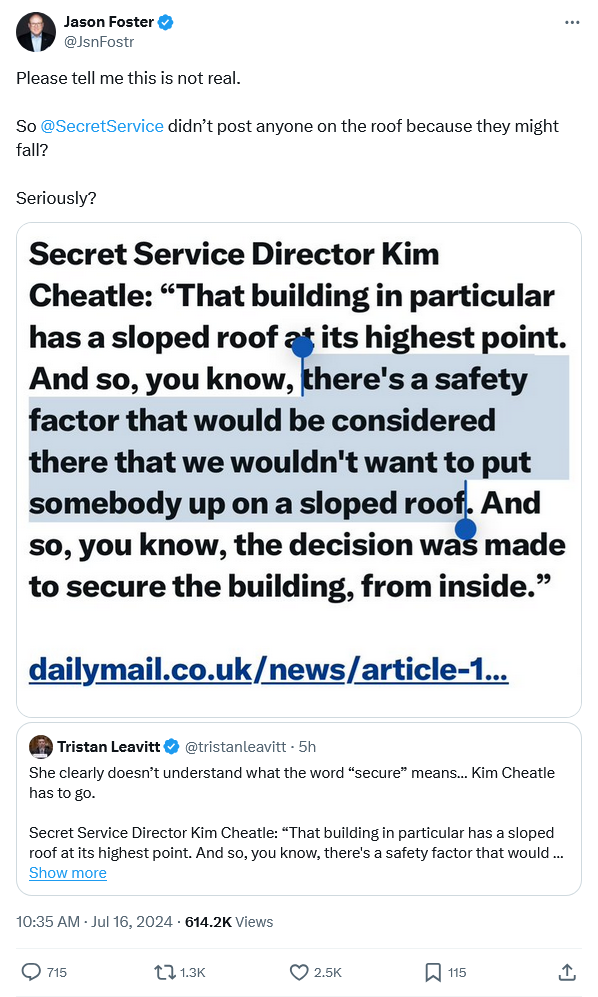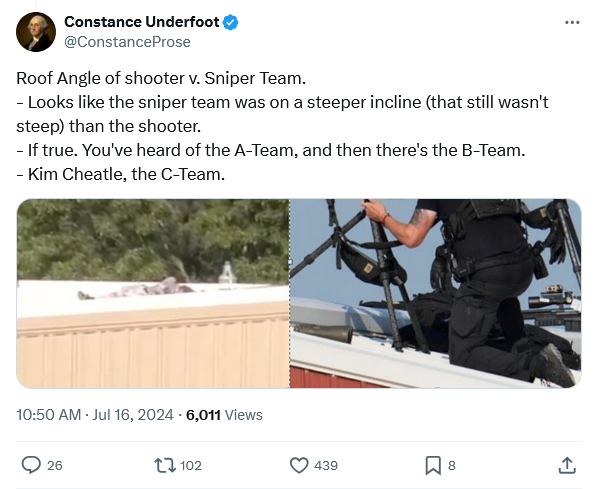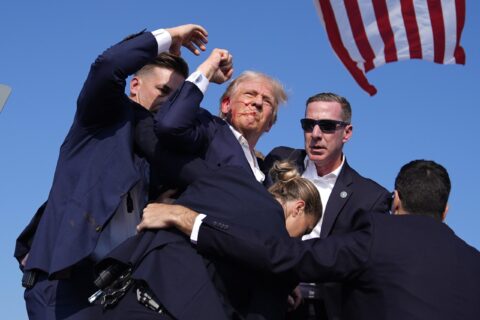I haven’t been following every twist and turn of the post-assassination-attempt story, but this one really does have me scratching my head. According to the person who had the overall responsibility, the reason the shooter’s location was not properly secured was due to health and safety concerns … for the Secret Service agents, rather than the person they were supposed to be protecting:
Oddly, the roof that the counter-sniper team was occupying visually seems to have a steeper pitch than the one identified as too dangerous:
Since we’re looking at the biggest news event of the year (so far), let’s consider what N.S. Lyons calls “The World Spirit on a Golf Cart“:
I’m going to do something I normally resist doing and offer some hot take thoughts based on recent events. Not on the details of the attempted assassination of Donald Trump specifically (there’s already plenty of that out there), but on what feels like his role in our general moment in time.
In the minutes after Trump dodged a bullet on live television, I joked on Substack Notes that “one does not simply shoot Napoleon”. This proved open to misinterpretation in a few different directions, but what I meant was this:
Napoleon famously led from the front, charging time and again into a hail of bullets and cannon shot, and yet not once was he ever seriously injured. In fact his luck seemed so impervious that he quickly acquired a legendary aura of invincibility. This became part of his overwhelming charisma – meaning not just his social charm but the inexplicable sense of unstoppable destiny that he seemed to exude. This aura proved so captivating to normal men that when he escaped from exile and landed alone in France to … well let’s call it make his “reelection” bid, the army sent to stop him promptly surrendered and switched sides at the mere sight of him.
Napoleon had seemed to become something more than mere mortal: he was a living myth, a “man of destiny” whom Providence had handed some great role to play in history (for good or for ill) and who therefore simply couldn’t be harmed until that role had been fulfilled and the world forever changed. This is why when Hegel witnessed Napoleon he described him with awe as “the world-spirit on horseback”: he seemed truly an “epic” figure, the sweep of history seeming to have become “connected to his own person, [to] occur and be resolved by him” alone, one way or another.
This, it should be noted, used to be the standard way of explaining how the course of the world’s history was shaped. Thus was Alexander understood; thus was Caesar. Only after the Enlightenment and the onset of rationalistic modernity did this mythic view begin to wither away with the broader disenchantment of the world, to be replaced by a depersonalized and mechanistic view of historical causality.
We’re so back now though. Donald Trump has always been something of a bafflingly lucky man, as even his enemies are prone to admit. But witnessing him, in response to whatever whisper of Providence, tilt his head at precisely the right moment and degree to cheat death, I and it apparently many others can’t help but feel like he may be more than lucky – that he now seems as much myth as man.
And when he emerged, shaking off his bodyguards and streaked with blood, to stand and pump his fist in defiance beneath the American flag (as captured by a photographer who just happened to be there at the perfect place and time to reveal an era-defining symbolic image), this was rightly described by awed watchers in the stands and across the nation as “epic”. Maybe epic is the word that comes to their mind only because it’s become internet parlance for “cool shit”. But I suspect that they may mean more than that, that they may be attempting to describe the deeper charisma of someone who really seems to somehow have become a man of destiny, and that they intuited the scene as truly epochal in its meaning.
Earlier, Mark Steyn wondered whether the security failures in Butler were caused deliberately or through utter incompetence:
Let’s cut to the chase — the US Secret Service: In on it? Or just totally crap?
Well, I’ve thought the Secret Service were rubbish not just since we learned of the Cartagena hookers but for at least another decade before that. And increasingly, when it comes to American officialdom — from Kabul to Uvalde — to modify Henry Ford, you can get it in any colour as long as it’s bloated, lavishly over-funded and entirely dysfunctional.
And yet and yet … it’s hard to believe even these guys (plus their bevy of five-foot-two-eyes-of-blue Keystone chorus girls) could be this crap. Assuming for the purposes of argument that the body on the roof is actually that of the perp, a goofball barely out of high school hatched a plan to have Donald Trump’s head explode in close-up on live TV – and, wittingly or otherwise, the world’s most flush money-no-object security state did their best to help him pull it off.
In any accountable “public service”, the Secretary of Homeland Security and the Secret Service gal would already be gone. By this point after the Argentine invasion of the Falklands, Lord Carrington (Foreign Secretary), Sir Humphrey Atkins (Lord Privy Seal) and Richard Luce (Minister for Latin-American Affairs) had already resigned: see my column of September 17th 2001 expressing in my naïve Canadian way mystification as to why, six days later, all the 9/11 flopperoos had not been similarly dispatched.
Because that’s how it goes in the Republic of Non-Accountability, and, if he’s harbouring any doubts about his fitness for the job, Mayorkas figures it can wait till someone takes out RFK Jr. This is a depraved political culture.
What’s the old line? When seconds count, the police are minutes away? Not at a Secret Service event: even when the police are on site in massive overwhelming numbers, they’re still minutes away.







